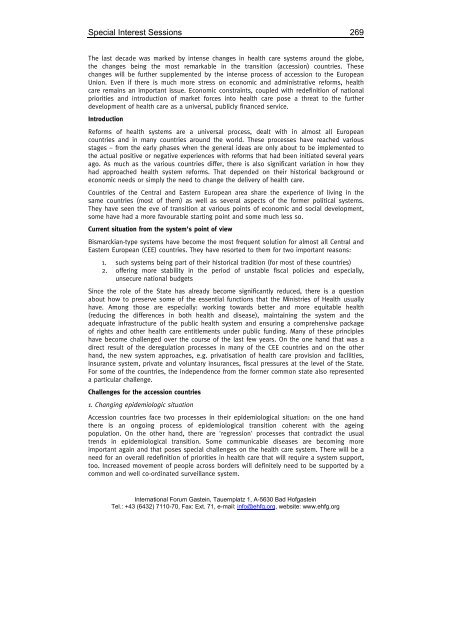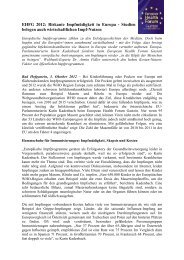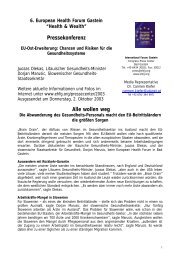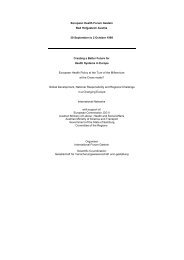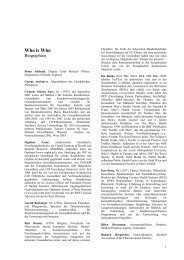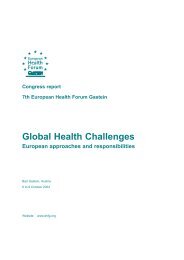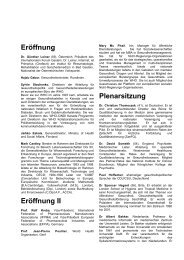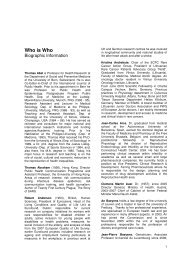Congress report - European Health Forum Gastein
Congress report - European Health Forum Gastein
Congress report - European Health Forum Gastein
Create successful ePaper yourself
Turn your PDF publications into a flip-book with our unique Google optimized e-Paper software.
Special Interest Sessions<br />
The last decade was marked by intense changes in health care systems around the globe,<br />
the changes being the most remarkable in the transition (accession) countries. These<br />
changes will be further supplemented by the intense process of accession to the <strong>European</strong><br />
Union. Even if there is much more stress on economic and administrative reforms, health<br />
care remains an important issue. Economic constraints, coupled with redefinition of national<br />
priorities and introduction of market forces into health care pose a threat to the further<br />
development of health care as a universal, publicly financed service.<br />
Introduction<br />
Reforms of health systems are a universal process, dealt with in almost all <strong>European</strong><br />
countries and in many countries around the world. These processes have reached various<br />
stages – from the early phases when the general ideas are only about to be implemented to<br />
the actual positive or negative experiences with reforms that had been initiated several years<br />
ago. As much as the various countries differ, there is also significant variation in how they<br />
had approached health system reforms. That depended on their historical background or<br />
economic needs or simply the need to change the delivery of health care.<br />
Countries of the Central and Eastern <strong>European</strong> area share the experience of living in the<br />
same countries (most of them) as well as several aspects of the former political systems.<br />
They have seen the eve of transition at various points of economic and social development,<br />
some have had a more favourable starting point and some much less so.<br />
Current situation from the system's point of view<br />
Bismarckian-type systems have become the most frequent solution for almost all Central and<br />
Eastern <strong>European</strong> (CEE) countries. They have resorted to them for two important reasons:<br />
1. such systems being part of their historical tradition (for most of these countries)<br />
2. offering more stability in the period of unstable fiscal policies and especially,<br />
unsecure national budgets<br />
Since the role of the State has already become significantly reduced, there is a question<br />
about how to preserve some of the essential functions that the Ministries of <strong>Health</strong> usually<br />
have. Among those are especially: working towards better and more equitable health<br />
(reducing the differences in both health and disease), maintaining the system and the<br />
adequate infrastructure of the public health system and ensuring a comprehensive package<br />
of rights and other health care entitlements under public funding. Many of these principles<br />
have become challenged over the course of the last few years. On the one hand that was a<br />
direct result of the deregulation processes in many of the CEE countries and on the other<br />
hand, the new system approaches, e.g. privatisation of health care provision and facilities,<br />
insurance system, private and voluntary insurances, fiscal pressures at the level of the State.<br />
For some of the countries, the independence from the former common state also represented<br />
a particular challenge.<br />
Challenges for the accession countries<br />
1. Changing epidemiologic situation<br />
Accession countries face two processes in their epidemiological situation: on the one hand<br />
there is an ongoing process of epidemiological transition coherent with the ageing<br />
population. On the other hand, there are 'regression' processes that contradict the usual<br />
trends in epidemiological transition. Some communicable diseases are becoming more<br />
important again and that poses special challenges on the health care system. There will be a<br />
need for an overall redefinition of priorities in health care that will require a system support,<br />
too. Increased movement of people across borders will definitely need to be supported by a<br />
common and well co-ordinated surveillance system.<br />
International <strong>Forum</strong> <strong>Gastein</strong>, Tauernplatz 1, A-5630 Bad Hofgastein<br />
Tel.: +43 (6432) 7110-70, Fax: Ext. 71, e-mail: info@ehfg.org, website: www.ehfg.org<br />
269


